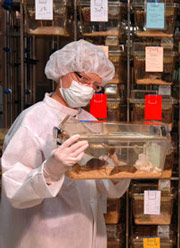Fewer animal experiments in medicines testing: another success for the German federal institutes
On the occasion of the World Day for Laboratory Animals on 24 April, animal welfare organisations again demand a paradigm change and a withdrawal from animal experiments. In the case of regulatory animal experiments based on the legal requirements for the development and testing of medicines, the Paul-Ehrlich-Institut, Federal Institute for Vaccines and Biomedicines (PEI) has successfully committed itself for achieving these goals for decades. Now, members of staff of the PEI jointly with their colleagues at the Bundesinstitut für Arzneimittel und Medizinprodukte (BfArM, Federal Institute for Drugs and Medicinal Products) have reached the goal that as from 2019, a formerly frequently used animal test for medicine development will no longer be permitted in Europe.

Animal tests are legally required for marketing authorisation and quality control of vaccines and other medicinal products to guarantee the safety for persons to be vaccinated, These are laid down in the monographs of the European Pharmacopoeia. Changes of a Pharmacopoeia monograph, such as the replacement or improvement of an animal test is preceded by a complicated and cumbersome process, in which methods and data in this procedure are reviewed in working parties and discussed among medical professionals. To reach a decision in the European Pharmacopoeia Commission , the member countries of the Council of Europe must agree unanimously.
The abnormal toxicity test (ATT) is the oldest animal safety test for medicinal products prescribed by law. It was introduced more than 100 years ago for the exclusion of toxic substances in diphtheria serum, and has ever since been required as safety test in medicines. The European Pharmacopoeia Commission has recently decided to suppress the ATT (1). "We are glad that our expertise, energy, and perseverance have contributed to the test for abnormal toxicity being discontinued. For the future, we rely on world-wide harmonisation. This is a further successful step on the road to reducing animal tests in the field of medicines research, marketing authorisation, and testing to a necessary minimum"
, said Professor Klaus Cichutek, president of the PEI.
The ATT in mice and guinea pigs will be deleted from altogether 49 individual monographs. One of the oldest and most wide-spread animal tests for medicines testing has thus been removed entirely from the European Pharmacopoeia upon publication of the next issue, and must no longer be performed in Europe as per 1 January 2019. After the European Partnership for Alternative Approaches to Animal Testing‘ (EPAA), an initiative of the European Commission and European Industry advocated a deletion of the ATT (2), experts of the PEI and the BfArM compiled documents for the deletion of the animal test in a procedure that required a high workload and high expenses, and drafted the appropriate requests for revision.
Background
The ATT as routine test for the batch release of medicines in Europe stopped being compulsory as early as twenty years ago. The results of a research project conducted at the PEI and obtained from a research project funded by the Bundesministerium für Bildung und Forschung (BMBF, Federal Ministry of Education and Research) paved the way for this step (3, 4). The PEI has performed research for methods designed to replace animal tests for decades and promotes the complex processes leading to a change in the corresponding regulations for test methods.
Since then, the ATT has been required in Europe only for the development of medicines, not in batch control testing. However, in some regions of the world, e.g. in Asia and at the World Health Organization (WHO), the ATT still forms part of some test assays. Since medicines are marketed world-wide, the ATT may still have to be performed based on legal regulations of other countries until a harmonisation has been reached at a global level.
As part of the so-called '3-R principle' (reduction, refinement, replacement), the PEI has been rewarded 17 with animal welfare and animal welfare research awards 17 times.
- Suppression of the Test for Abnormal Toxicity from the European Pharmacopoeia. EDQM Press Release.
Schutte K, Szczepanska A, Halder M, Cussler K, Sauer UG, Stirling C, Uhlrich S, Wilk-Zasadna I, John D, Bopst M, Garbe J, Glansbeek HL, Levis R, Serreyn PJ, Smith D, Stickings P (2017): Modern science for better quality control of medicinal products "Towards global harmonization of 3Rs in biologicals": The report of an EPAA workshop.
Biologicals 48: 55-65.
Online-Abstract
Schwanig M, Nagel M, Duchow K, Krämer B (1997): Elimination of abnormal toxicity test for sera and certain vaccines in the European Pharmacopoeia.
Vaccine 15: 1047-1048.
Text
- PEI Press Release (02.02.1996): Weniger Tierversuche in der Arzneimittelprüfung
Further information
www.pei.de/tierschutz
Contact:
Paul-Ehrlich-Institut
Press Office
Telefon: +49 6103 77 1030
Email: presse@pei.de
top



